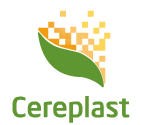- 2 reads

Petroleum-based plastics are ubiquitous in everyday life – they are used for the production of shopping bags, water bottles, coffee cups, toys, shampoo bottles, candy wrappers and thousands of other products. However, the production and disposal of petroleum-based plastic is incredibly toxic to the environment. Thankfully, there are companies like Cereplast, who manufacture bio-based, renewable plastics that can be used as substitutes for their petroleum-based counterparts.
Cereplast produces a bio-based plastic alternative that is created from domestically sourced, renewable resources such as wheat, tapioca, potato starches, corn and algae. The company offers two different lines of bio-based plastic resins: Cereplast Compostables and Cereplast Sustainables. The Cereplast Compostables line replaces nearly 100% of the petroleum-based additives used in traditional plastic. This line meets the Biodegradable Products Institute (BPI) and European Bioplastics standards for compostability. Their second line, Cereplast Sustainables, replaces up to 70% of the petroleum content in conventional plastics and is used in various markets from automotive to consumer electrics and construction.
The bio-based plastics produced by Cereplast are capable of being manipulating by the conventional plastic converting processes – such as injection molding, thermoforming, blow molding, and extrusions – eliminating the need to develop new technology to manufacture the bio-based products. This combination of a sustainable solution to petroleum-based plastics and the use of existing manipulation processes is contributing to the ongoing success of the bio-based plastic industry.
In addition to producing a more sustainable plastic, the company is also seeking to educate the public on the environmental advantages of using plant-based bioplastics as an alternative in product manufacturing. The bioplastics look the same and feel the same, but they don’t harm the earth like petroleum-based plastics.
With 60 to 100 million barrels of oil being used annually to manufacture plastic bags and 8 out of 10 plastic water bottles ending up in the landfill each year, providing an alternative to petroleum based plastics is definitely a step in the right direction.
Want more? Check out Cereplast's 'Environmental Choice' video.

